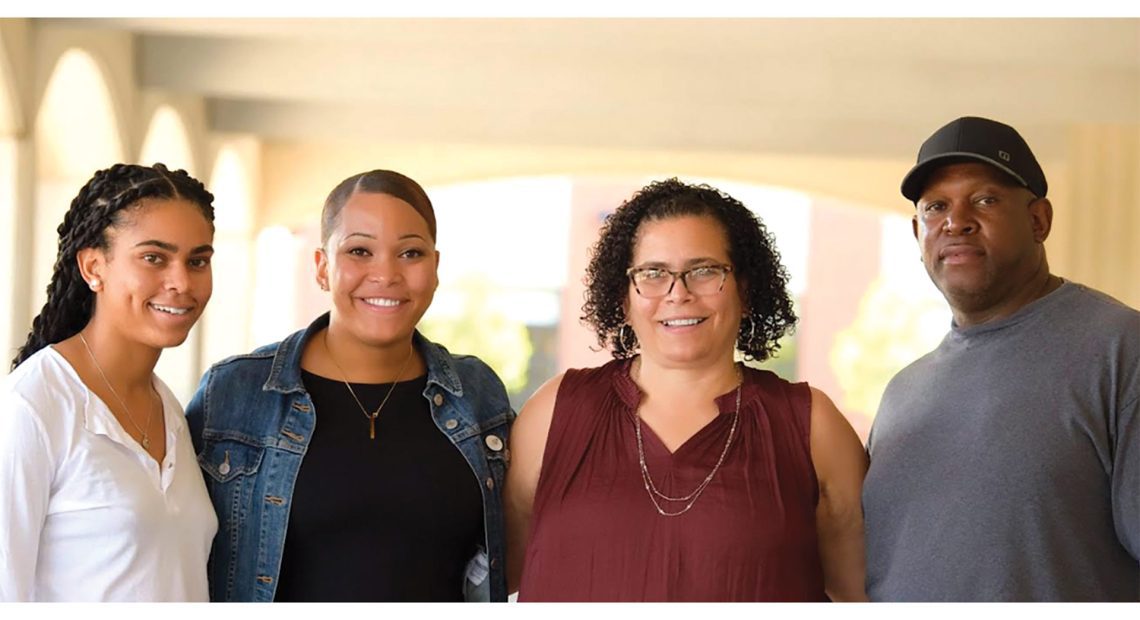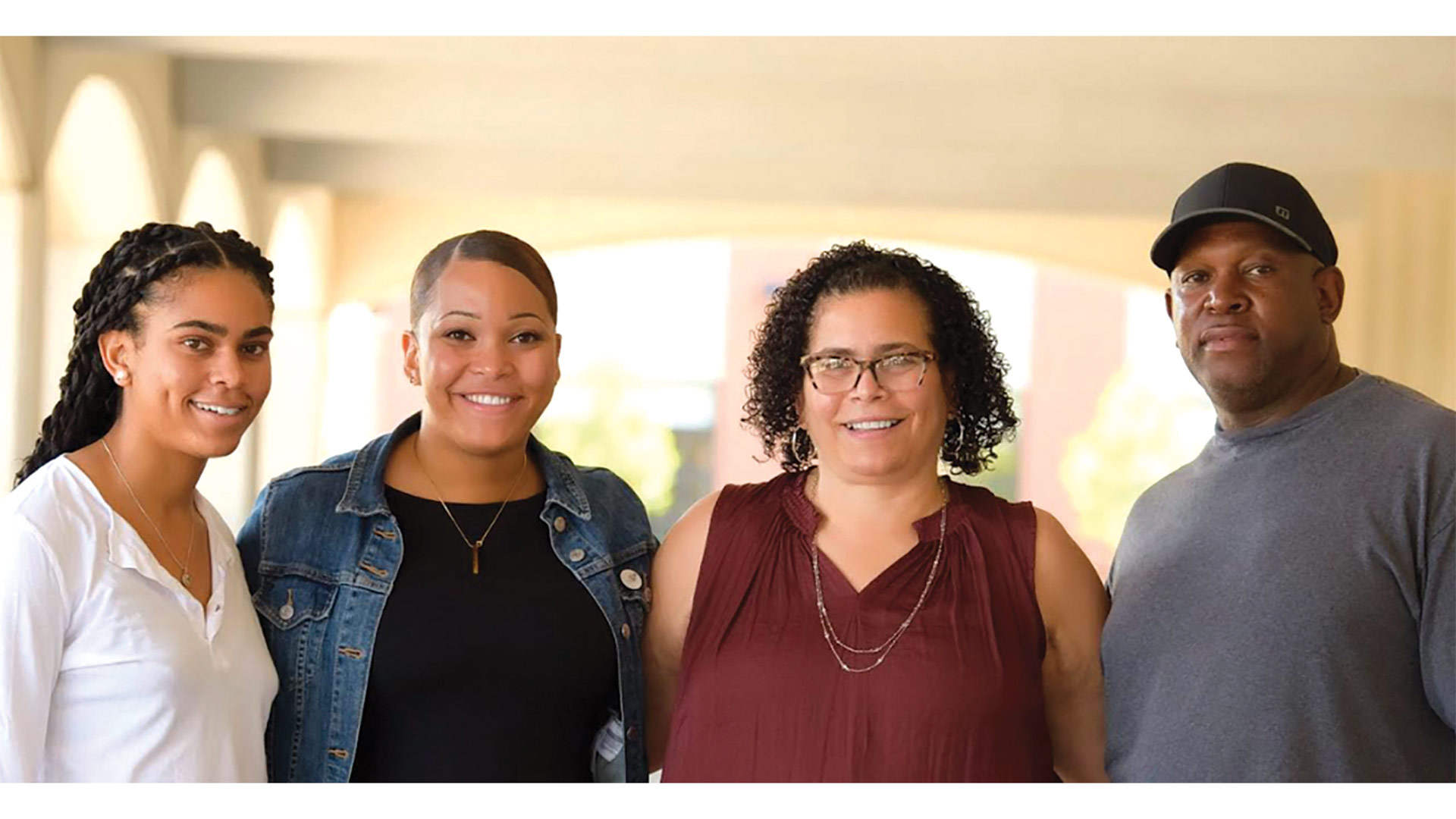Staying True to Their Routes

Melissa and Peter A. Picknelly (far left and right) with fourth-generation company leaders Lauryn Picknelly-DuBois, Alyssa Picknelly-Dube, and Peter B. Picknelly. (Staff Photo)
The past five years have brought a raft of challeges to the world of tourism and transportation.
The biggest one? Survival.
“The worldwide pandemic was tough on our industry, and many other industries,” Peter A. Picknelly, chairman and CEO of Peter Pan Bus Lines, told BusinessWest. “For three years, we had the government using our tax dollars to tell people not to use our service.”
There’s a bit of edge in his voice as he brings up topics like shutting down travel, and then restrictions like social distancing that accompanied its gradual return.
“But we survived, and we’re thriving now. We’ve invested $25 million in new equipment in the last couple of years. We’re modernizing our fleet, which is what our consumer wants; they want a nice, clean, modern bus. And we’re continuing to expand our route structure,” he said, noting that Peter Pan serves about 100 locations in the Northeast and Mid-Atlantic states.
“We listen to our customers — where they want to go — and we expand where it makes sense. We recently expanded to Newark, New Jersey, and a suburb right outside of Baltimore called White Marsh. And we’ve added service on Cape Cod. We’re always looking at new areas.”
But the company is also looking to the future in other ways, most notably some emerging leadership from the fourth generation of this family business launched by Picknelly’s grandfather in 1933.
“You just don’t see workers commuting to work, and if they do, they’re not working Mondays and Fridays. I mean, the full-time office worker is just not rebounding. It’s better than it was, and it will eventually come back, I think, but some businesses are just going to thrive on people that work remotely.”
“I kind of grew up just learning from him and wanting to work here,” said Peter B. Picknelly, one of three children of Peter A. and Melissa Picknelly (the company’s vice president) now working at Peter Pan. A fourth is still in college and mulling career goals.
“I had no doubt in my mind that this is what I wanted to do,” added the younger Peter, who is the company’s director of Safety & Security. “I grew up going to school and trying to better myself so I could then come into the business. That’s what I always wanted to do.”
That’s a story his father can relate to. “I’m the third generation; Peter and his sisters are the fourth,” he said. “But I never forced them into it. When I grew up, some kids wanted to be baseball players or football players. All I wanted to do was follow my father and grandfather. And I can’t tell you how proud I am that our kids chose to do that — but it was their decision.”

Peter A. Picknelly, standing before some portraits of his predecessors, says there are very few family-owned bus companies in the U.S. today.
Staff Photo
Other fourth-generation leaders at Peter Pan include Lauryn Picknelly-DuBois, who was promoted two years ago to controller, and Alyssa Picknelly-Dube, who is involved with the Maintenance division. (A fourth child is still in college and mulling career goals.)
“There are very few family-operated bus companies in the United States anymore,” their father said. “Here, the fourth generation is already set, and they’re still in their 20s. I think it assures our employees and our customers that we will be around for a long time. They are doing an amazing job.”
All Aboard
They’re doing it at a time when public-transportation demographics might be changing, but bus travel clearly remains important.
Peter Pan specializes in travel that’s longer than a typical work commute, but within 200 miles — a distance that can be covered as quickly as flying, once the airport time is factored in, the senior Picknelly explained.
These days, most travelers are between 18 and 35 years old or over 50, he added. “They may have an automobile, but the bus is more affordable. We go city center to city center. And parking can be extremely expensive in some areas, and hard to find.”
He added that the pandemic hit the work-commuter customer base hard, and it’s still struggling, at around 60% of pre-pandemic volume.
“You just don’t see workers commuting to work, and if they do, they’re not working Mondays and Fridays. I mean, the full-time office worker is just not rebounding. It’s better than it was, and it will eventually come back, I think, but some businesses are just going to thrive on people that work remotely.”
That said, the longer-distance service — say, Boston to New York or New York to Philadelphia — is booming, especially as gas prices have remained high and cities have gone to congestion pricing.
And gas prices do make a difference, he added. “You can instantly see it when gas prices go up. Our cost of operation goes up when fuel goes up — it’s our third-largest cost. But it’s outweighed by the fact that more people seek an alternative. When fuel hits $3, $4 a gallon, you can see an instant surge.”
That said, today’s buses are much more fuel-efficient, Picknelly said, and feature an anti-idling function that shuts them off when they idle at a gate or while parked for more than five minutes (but not while in traffic).
“There are situations when the idling won’t turn off — say it’s middle of winter and it’s freezing, and you want to heat up a little bit. That will override the five-minute idle shutdown,” Peter B. Picknelly said. “Same thing if it’s too hot — to keep the bus cool, it’ll override it.”
Other features of a modern bus include better-designed seats, video and Wi-Fi, and cameras that capture a 360-degree view of the bus for safety purposes.

Peter B. Picknelly, director of Safety & Security, is one of three fourth-generation family members so far to have chosen Peter Pan as a career.
Staff Photo
As for those who drive the buses — the current fleet is about 200 vehicles — the younger Picknelly said the workforce crunch was severe a couple of years ago, but hiring has picked up considerably since. “We get a lot of applications every single day, so we’re able to be a little bit more picky when it comes to the driver force.”
His father noted that hiring is easier in some areas than in others. “We’re constantly hiring. But while Cape Cod and Boston are difficult locations, with our driver forces in New York and D.C., we have plenty of applications.”
Peter Pan has been receiving more applications these days from younger people, and the company has brought on employees in the process of getting their commercial driver’s license, and even reimbursed them for it.
“It’s a very good job if you like to drive and you want to deal with people,” Picknelly said. “Our drivers choose what routes they want to operate and when they want to work. Our position is, if you like doing what you want to do, you’re going to do a better job.
“But you’ve got to like to drive, and you’ve got to like to deal with people,” he added. “We can train just about anybody to drive a bus. But you can’t train someone to have good customer-service skills. And wanting to drive is just something you’ve got to have a passion for. Because that’s what we do.”
The younger Picknelly agreed. “It’s good getting these young people on board because most of the time they’re pretty loyal, and they want to stick with the company for a long time. We have people who have been here for so long because they came on when they were younger and were extremely loyal to the company, and that’s what we’re hoping to get now.”
Shifting Gears
Looking to the future, Peter Pan continues to find more ways to be the transportation mode of choice for its customers, especially younger riders, and that means making their travel plans easier.
To that end, the company recently announced a new strategic partnership with Trailways, extending its network of destinations, as well as a strategic alliance with Amtrak.
“So you can take a train somewhere, and then they’ll connect to a bus, and we can take you right to the city center,” Peter A. Picknelly said, and from there, rideshares can take over. “We’re also forming alliances with Ubers and Lyfts where you can coordinate being picked up wherever we drop you off, and instantly getting in an Uber and taking it to your final destination. Because of this coordination, more and more people are saying they don’t need to drive, particularly young people that live in the big city.”
“We can train just about anybody to drive a bus. But you can’t train someone to have good customer-service skills. And wanting to drive is just something you’ve got to have a passion for.”
Statistics bear that trend out. Last year, driver’s license applications actually went down, reversing a 50-year upward trend, he noted.
“It’s so convenient. If you go to Europe, taking public transportation is always involved, and you’re seeing more of that here. It’s way more convenient, and with the amenities in the vehicle, you can work or entertain yourself while you’re traveling. You can’t do that when you’re driving.”
Peter Pan also maintains a model of managing terminals — another one of Peter B. Picknelly’s roles — in its destination cities, with amenities like food, restrooms, a service counter, and a pickup area, instead of the model of picking up and dropping off on unattended corners.
“We don’t like picking up on a street corner like some of these other bus companies,” Peter B. added. “We like going into a terminal or a specific designated area, so they can have that one-on-one personal experience with our employees if they have an issue or have any questions or concerns. We’re a customer-driven business, so we like pleasing the customers.”
About 15% of Peter Pan’s business, meanwhile, is charter service to destinations not on the regular route plan.
“Charters are very big, and in the summer, it picks up a lot. There are people who go out to Saratoga Race Course on the weekend; that’s a very popular place. We’ll take them wherever.”
One shift that occurred over the pandemic years has been a move toward online booking, his father added.
“Prior to COVID, about 50% of our riders would buy their ticket a half-hour before departure, in person. Now, 90% of our sales now are in advance. Most people are booking within three days of their trip, online.”
But, as mentioned up top, the biggest story of the pandemic for Peter Pan was … well, simply surviving it, and coming out stronger on the other side, with plans for the future and a band of 20-something Picknellys ready to evolve into stronger leadership roles.
“We’re really proud of all of our staff,” their father said. “Listen, 40% of all bus companies didn’t make it through the pandemic. We did, and we’re thriving. We’ve had to change our focus on longer-distance trips, less commuter-related, more group travel, but we’re doing well.”
Peter B. Picknelly agreed. “In hindsight, COVID was horrible, but it made us think about how we could run things differently here, and it’s been beneficial.”











 “The most prolonged and venomous arguments I’ve witnessed in my estate-administration practice have not been over money.”
“The most prolonged and venomous arguments I’ve witnessed in my estate-administration practice have not been over money.”








